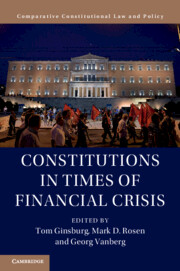
- Cited by 2
-
Cited byCrossref Citations
This Book has been cited by the following publications. This list is generated based on data provided by Crossref.
Gulati, Gaurang Mitu Panizza, Ugo Weidemaier, Mark C. and Willingham, Grace 2019. When Governments Promise to Prioritize Public Debt: Do Markets Care?. SSRN Electronic Journal,
2020. Book Notes. Law & Social Inquiry, Vol. 45, Issue. 1, p. 265.
- Publisher:
- Cambridge University Press
- Online publication date:
- June 2019
- Print publication year:
- 2019
- Online ISBN:
- 9781108679404




